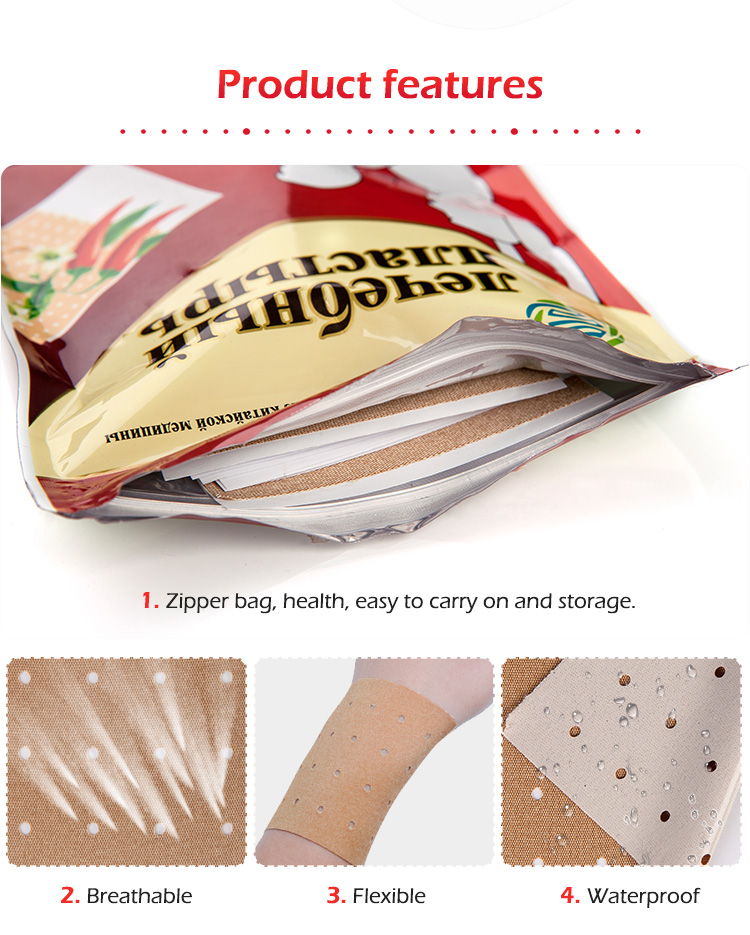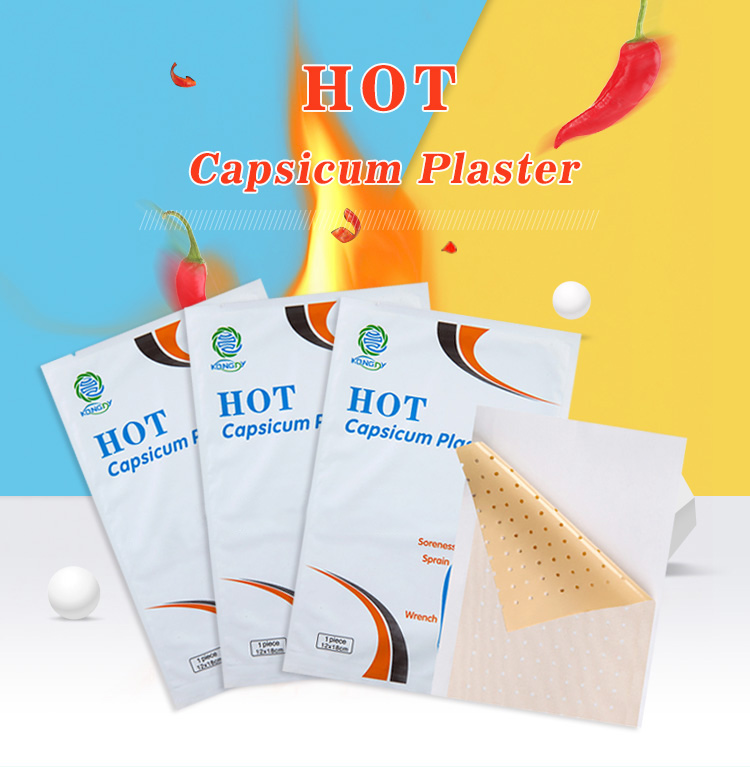What Certifications Should My Natural Capsicum Plaster Manufacturer Have? A Complete Guide for Global Compliance and Market Success
In the highly regulated and competitive field of topical pain relief products, certifications are not just a formality—they are your gateway to safety, compliance, credibility, and market access. If you're working with a Natural Capsicum Plaster Manufacturer or planning to launch a Private Label Natural Capsicum Plaster, understanding which certifications your manufacturing partner should hold is critical for business success.
This article will walk you through the essential certifications a qualified Natural Capsicum Plaster OEM should possess, why these certifications matter, and how they support the development of Custom Natural Capsicum Plaster products for global markets.

Why Certifications Matter in the Natural Capsicum Plaster Industry
Choosing a Natural Capsicum Plaster Supplier with proper certifications ensures:
Product Safety: Verified production practices reduce contamination and ensure consistent quality.
Regulatory Compliance: Avoid customs delays, fines, or product recalls.
Market Access: Certifications open doors to lucrative regions like the US, EU, Japan, and the Middle East.
Brand Credibility: Certified products build trust with consumers, retailers, and distributors.
Long-Term Scalability: A certified manufacturer can grow with your brand and meet increasing demand.
Whether you're developing a Custom Natural Capsicum Plaster or launching under your own brand, working with a certified partner is essential.
Essential Certifications for a Natural Capsicum Plaster Manufacturer
1. ISO 13485 – Medical Device Quality Management System
Why it matters: ISO 13485 is the international standard for quality management systems in the design and manufacture of medical devices—including therapeutic plasters.
Benefits:
Ensures quality consistency
Enables market entry in countries requiring medical-grade GMP
Critical if your capsicum plaster is regulated as a Class I medical device
Who needs it: Any Natural Capsicum Plaster OEM manufacturing for EU, UK, Canada, or other stringent regions.
2. GMP (Good Manufacturing Practices) Certification
Why it matters: GMP ensures that products are consistently produced and controlled according to quality standards. It's a global requirement for safety and hygiene in manufacturing.
Key elements:
Cleanroom manufacturing
Batch traceability
Contamination control
Trained personnel and documentation
Look for:
WHO-GMP for international recognition
cGMP if you plan to enter the US market
GMP-certified Natural Capsicum Plaster Manufacturers are more likely to pass audits and support regulatory submissions globally.
3. FDA Registration (U.S. Food and Drug Administration)
Why it matters: The FDA regulates all medical devices and drug products in the U.S., including transdermal patches like capsicum plasters.
Requirements:
Facility registration with the FDA
Listing of product as a Class I or II medical device, depending on function
Adherence to 21 CFR Part 820 (GMP requirements)
If you want to launch a Private Label Natural Capsicum Plaster in the U.S., ensure your OEM partner is FDA-registered and experienced with U.S. documentation.
4. CE Marking (European Union)
Why it matters: The CE mark is mandatory for selling medical products in the European Union.
Requires:
Conformity assessment under the EU Medical Device Regulation (MDR 2017/745)
A Natural Capsicum Plaster Manufacturer with a Notified Body partnership
A comprehensive Technical File and Risk Analysis
Without CE certification, your capsicum plasters cannot legally be sold in Europe.
5. ISO 9001 – Quality Management System
Why it matters: ISO 9001 demonstrates an organization’s ability to consistently provide products that meet customer and regulatory requirements.
While not specific to medical devices, it supports your brand’s reputation and provides assurance that your Natural Capsicum Plaster OEM follows global quality standards.
6. MSDS (Material Safety Data Sheet) and COA (Certificate of Analysis)
Why it matters: These are not certifications but essential documents.
MSDS: Required for international shipping and safety compliance
COA: Confirms ingredient purity and concentration in each batch
A reliable Natural Capsicum Plaster Supplier should offer these for every production run, especially for Custom Natural Capsicum Plaster formulations.
7. HALAL, Vegan, Organic, and Other Specialty Certifications (Optional but Valuable)
Depending on your target market and brand values, you may also look for:
HALAL Certification for Muslim markets
Vegan Certification to avoid animal-derived ingredients
USDA Organic or Ecocert certification for natural wellness branding
These are especially valuable for Private Label Natural Capsicum Plaster brands looking to serve niche or premium markets.
How to Verify Certifications
It’s not enough for a Natural Capsicum Plaster Manufacturer to claim certifications—they must prove them. Here’s how to verify:
Request Copies of ISO, CE, GMP, and FDA documentation
Check Expiry Dates and issuing authorities
Ask for Audit Reports or third-party inspection results
Contact Regulatory Authorities (FDA, Notified Bodies) for confirmation
Visit the Factory or request a virtual audit if possible
Transparency is a sign of a trustworthy Natural Capsicum Plaster OEM.
Certifications by Market: What You Need Based on Your Target Region
| Market | Required Certification | Notes |
|---|---|---|
| USA | FDA Registration, cGMP, COA, MSDS | Class I or II depending on claim |
| European Union | CE Mark, ISO 13485, Technical File | Strict MDR compliance |
| Middle East | HALAL, ISO 9001, MSDS | HALAL is often mandatory |
| Asia-Pacific | Varies (Japan PMDA, Australia TGA) | Local registration may be needed |
| Global Export | WHO-GMP, ISO 9001, MSDS, COA | Universal compliance baseline |
Red Flags to Watch Out For
Avoid Natural Capsicum Plaster Suppliers that:
Refuse to provide certification copies
Use outdated or unverifiable documents
Cannot demonstrate prior international exports
Don’t follow proper labeling or documentation practices
A lack of certifications may lead to customs rejection, market recalls, and reputational damage—none of which a growing brand can afford.
Benefits of Working with a Certified Natural Capsicum Plaster OEM
Choosing a certified partner gives you:
Faster market entry
Higher product quality
Fewer compliance issues
Increased consumer trust
Competitive positioning for Custom Natural Capsicum Plaster solutions
Whether you’re launching under your own brand or via Private Label Natural Capsicum Plaster, certification is your foundation for scalable success.
Final Thoughts
Your choice of Natural Capsicum Plaster Manufacturer is a decision that goes far beyond price or capacity. Certifications serve as a blueprint for legal compliance, customer safety, and global credibility. Always prioritize manufacturers that meet international standards and are transparent about their credentials.
In short, if you're looking to build a reputable, export-ready line of Custom Natural Capsicum Plaster products, make certifications your first checkpoint. A qualified Natural Capsicum Plaster OEM with ISO, GMP, CE, and FDA credentials is not just a supplier—they’re your partner in long-term brand success.
Related Questions and Short Answers
Q1: What’s the difference between ISO 9001 and ISO 13485?
A1: ISO 9001 is a general quality management standard, while ISO 13485 is specific to medical devices like capsicum plasters.
Q2: Can I sell my Private Label Natural Capsicum Plaster in the EU without CE marking?
A2: No. CE marking is mandatory for medical products sold in the EU.
Q3: How do I know if my Natural Capsicum Plaster Manufacturer is FDA registered?
A3: Ask for their FDA Establishment Registration Number or check the FDA database.
Q4: Do certifications guarantee product effectiveness?
A4: No, but they guarantee safety, consistency, and regulatory compliance—which builds consumer trust.
Q5: Can I still export without HALAL certification?
A5: It depends on your market. For Muslim-majority countries, HALAL is often required.






